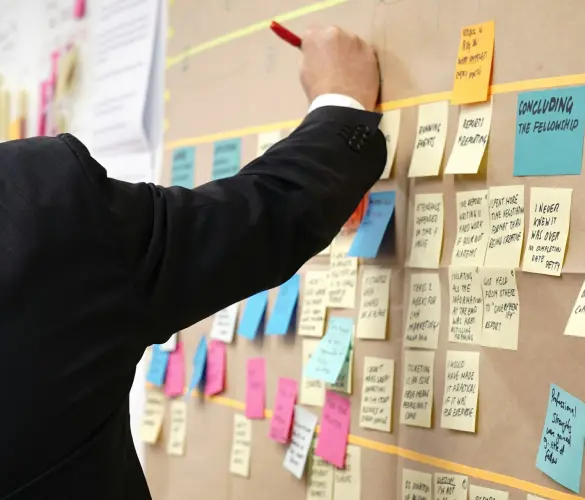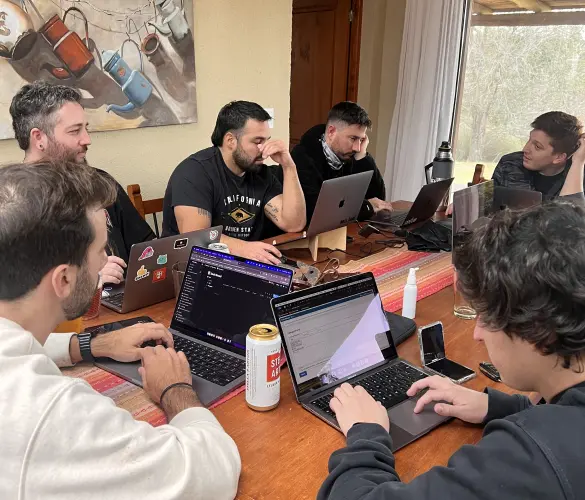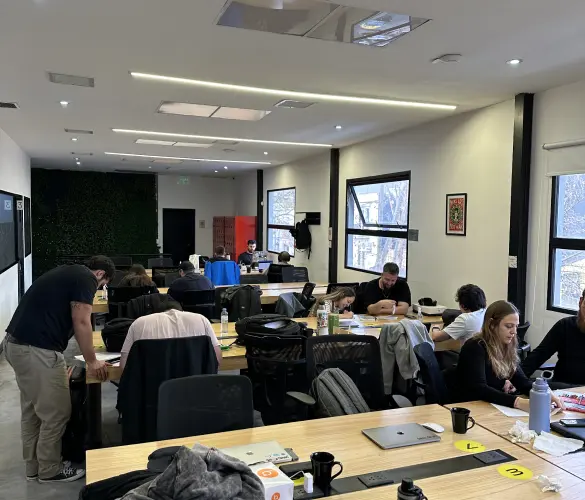Is WordPress Dying in 2024?

The question, “Is WordPress dying?” seems to be as old as WordPress itself, but is there any truth to it? If you’re considering whether you should use WordPress in 2024 and beyond, keep reading to learn why WordPress remains the most popular content management system in the world and why you may want to build your site with WordPress.
Key Takeaways
- WordPress is the world’s most popular content management system, powering over 40% of all sites.
- For years, rumors have been circulating about WordPress’s impending downfall. The reasons given range from an overreliance on plugins to security vulnerabilities.
- Despite the criticism, WordPress is not dead or dying and remains the most popular way to build a site in 2024 and beyond.
What is WordPress?
WordPress is the world’s most popular content management system (CMS). It is an open-source CMS that helps you create and manage websites.
It started as a blogging platform in 2003 but evolved to support a wide range of websites, including large enterprise sites, ecommerce stores, portfolios, small business sites, news outlets, and more.
WordPress is known for its flexibility, ease of use, and extensive library of themes and plugins that allow users to customize their sites without needing advanced technical skills.
As of writing, 43.4% of all websites on the internet are built using WordPress. Its popularity has exploded over the past decade, more than doubling since 2013, when it had a 17.4% market share.
On the CMS market, WordPress is even more dominant, powering 62.7% of all websites that use a known CMS (some websites use custom-made CMSs that are not publicly available).
In the CMS market, WordPress’s closest competitor is Shopify with a 6.5% market share.
Why Do Some People Think WordPress Is Dying?
So, if WordPress is the most popular CMS in the world by a large margin, why do some people claim that WordPress is dying?
There really aren’t that many people claiming WordPress is a sinking ship, but you may still find a few disgruntled site owners and web developers if you go digging through comment threads. Additionally, you may come across some articles telling you all the reasons why WordPress is dead, and you shouldn’t use it.
Some of the most common arguments provided for why you should avoid WordPress include:
- Sites are too reliant on plugins and themes that may be abandoned by their developers, leaving site owners and developers to scramble for an alternative.
- Due to its popularity, it’s a common target for hackers, and therefore, it’s unsafe to use.
- Big WordPress sites require custom code to work; therefore, you need deep web development knowledge to create them. For some no code developers, this is a big problem.
- Plugin incompatibilities can sometimes break your site.
- WordPress has a lot of unnecessary code that bloats and slows down your site.
- WordPress is self-hosted and, as a result, does not provide dedicated support. That said, you can still get tech support from your hosting provider.
- Paying for WordPress hosting and premium plugins and themes is expensive.
- The WordPress core relies on PHP, a programming language that many web developers are migrating away from.
- WordPress doesn’t have a built-in caching solution.
These are some of the most common arguments you’ll hear about why WordPress is dying and you shouldn’t.
Is WordPress Still Relevant?
Now that you’ve heard some of the most popular reasons why some think you shouldn’t use WordPress, let’s figure out whether they are true and whether you should be worried about the future of WordPress.
Are There Many Abandoned Plugins and Themes?
Yes, there are many abandoned plugins and themes in WordPress. This happens for several reasons, including developers losing interest, moving on to other projects, or lacking the resources to maintain their work.
The main problem with using an abandoned plugin or theme is that it opens your site to security vulnerabilities. Unmaintained plugins and themes may have unpatched security flaws that hackers can exploit.
There’s also the problem of incompatibility. As WordPress updates, abandoned plugins and themes might not work correctly with newer versions, leading to errors that can prevent you from accessing the editor or crashing your site entirely.
Here’s how you can spot an abandoned WordPress plugin or theme:
- Check the date of the last update: Check when the plugin or theme was last updated. If it hasn’t been updated in over a year, it might be abandoned.
- Support forum activity: Look at the support forum for the plugin or theme. If there are many unanswered questions, it may be a sign that the developer is no longer active.
- User reviews: Negative reviews often mention if a plugin or theme is no longer maintained.
But despite the many abandoned plugins and themes, there’s also widespread support for many other popular ones. Plugins like Yoast SEO, Contact Form 7, and WooCommerce make the backbone of many WordPress sites.
Additionally, themes like Astra and Hello Elementor have 1+ million downloads and are still going strong.
Is WordPress a Common Target for Hackers?
Unfortunately, yes. As the most popular CMS in the world, WordPress is a common target for hackers because there is just so much protected information inside WordPress sites, making it an attractive target for cybercriminals.
In addition to its popularity, hackers target WordPress sites because some plugins and themes are not properly secured, allowing bad actors to exploit their vulnerabilities.
However, this doesn’t mean WordPress itself is unsafe. WordPress as a platform is very secure, and security vulnerabilities seldom originate from the WordPress core files. Instead, plugins are the most common source of vulnerabilities.
In fact, according to iThemes Security (now SolidWP), 93.25% of vulnerabilities reported during 2022 originated from plugins.
Despite the challenges, it is possible to have a secure WordPress site if you:
- Install a reputable security plugin.
- Enforce strong passwords.
- Keep your WordPress version, plugins and themes updated.
- Hosting your site with a provider that emphasizes security.
- Regularly back up your site so you can roll back to a previous version in an emergency.
- Harden your login security.
- Ensure your website uses HTTPS.
If that seems like a long list and you believe WordPress expects too much from you, remember that you can never take website security for granted, regardless of your platform.
Hacking is a massive industry that costs trillions of dollars worldwide every year, and WordPress is not the only target. It’s just the most obvious one because of its popularity.
Do You Need to Code to Use WordPress?
No, you do not need to code to use WordPress, especially for basic website creation and management. That’s because WordPress is designed to be user-friendly and accessible to non-developers, so it uses a user-friendly interface that allows even the least technical website owner to learn how to manage content and install plugins and themes.
You can easily customize themes without code through the Appearance > Customizer or Appearance > Editor menus. There are also page builders plugins like Elementor, Divi, and Beaver Builder that provide advanced drag-and-drop page-building capabilities, enabling you to create complex layouts and designs without touching a line of code.
That said, WordPress ultimately comes down to code, and therefore, coding is the best way to get the most out of it. A full stack WordPress developer can create highly specific functionality or unique designs that cannot be achieved with existing themes and plugins, giving their clients a level of flexibility that would be impossible otherwise.
In summary, while coding skills can enhance your ability to customize and troubleshoot your WordPress site, they are not required for most users. WordPress provides a range of tools and features that allow anyone to create and manage a website easily.
Can Plugin Incompatibilities Break Your Site?
Yes, plugin incompatibilities can break your WordPress site. When plugins are incompatible with each other, your theme, or the WordPress core, they can lead to various issues, from minor glitches to major site crashes.
To prevent plugin incompatibilities, you should:
- Back up your site: Always back up your site before installing new plugins or updates. This allows you to restore your site if something goes wrong.
- Update regularly: Keep WordPress core, themes, and plugins updated to their latest versions to minimize compatibility issues.
- Test in staging environments: Use a staging environment to test new plugins or updates before applying them to your live site. This helps you identify conflicts without affecting your live site.
- Read reviews: User reviews can provide insights into potential compatibility issues. Look for comments about conflicts with other popular plugins or themes.
- Use only reliable plugins: Stick to plugins from reputable developers with a history of regular updates and good support.
Taking these precautions and proactive measures can significantly reduce the risk of plugin incompatibilities breaking your WordPress site.
Is WordPress Slow?
WordPress itself is not inherently slow, but various factors can affect the performance of a WordPress site. For example, the flexibility and customization options that make WordPress popular can also lead to a combination of settings that cause performance issues if not managed properly.
Here are some key factors that can impact the speed of a WordPress site:
- Hosting quality: The performance of your web hosting provider plays a crucial role. For example, shared hosting can be slower due to resource sharing with other websites.
- Heavy themes: Some themes are bloated with excessive features and poorly optimized code, which can slow down your site.
- Too many plugins: Using too many plugins, especially poorly coded ones, can significantly impact load times and lead to crashes.
- Unoptimized images: Large image files can slow down page loading times. Use image optimizers to compress your visual content for better performance.
- Database optimization: Over time, your database can become cluttered with unnecessary data, slowing down queries and page loads.
- Lack of caching: Without proper caching, your server has to process each request from scratch, which can be time-consuming. Use a caching plugin to optimize requests to your server.
- External scripts: Loading external scripts and resources (like fonts, ads, or analytics) can add to your site’s loading time.
- High traffic: Sudden spikes in traffic can overwhelm your server, leading to slower response times.
Using a lightweight theme, choosing a good hosting provider, limiting plugins to only the necessary ones, and reducing external resources can significantly improve the speed and performance of your WordPress site, ensuring a better user experience.
Does WordPress Have Dedicated Support?
WordPress, as an open-source platform, does not offer dedicated support like many commercial software or services. However, there are various resources and options available to get help and support for your WordPress site, including:
- WordPress.org forums: The official WordPress support forums are a great place to ask questions and get help from the WordPress community. Experienced users and volunteers often provide assistance here.
- Documentation: The WordPress Codex and official documentation offer comprehensive guides and tutorials on how to use and troubleshoot WordPress.
- Developer resources: The official WordPress developer resources provide in-depth information for developers, including how to create themes and plugins.
- Your hosting provider: Many managed WordPress hosting providers, like WP Engine, SiteGround, and Bluehost, offer dedicated support as part of their hosting packages. This includes assistance with WordPress-related issues.
- Premium themes and plugins: Developers of premium themes and plugins often provide dedicated support for their products. This can include help with installation, customization, and troubleshooting.
While the WordPress organization doesn’t provide dedicated support, there are enough resources out there to provide the support you need to solve any issue.
Is Running a WordPress Site Expensive?
Depending on your website’s needs, WordPress may or may not be expensive to maintain.
As an open-source, self-hosted platform, WordPress is free to download and use but requires you to pay for at least hosting and a domain name if you want your website accessible to the world.
These are the minimum expenses associated with WordPress, resulting in a yearly cost as low as $75 to $100 for DIY maintenance of a basic website with no significant expenses on plugins, themes, security measures, professional web developers, etc.
However, you’re looking at higher prices if your website is complex, requires dedicated hosting, and uses multiple paid themes and plugins. For example, a premium plugin can cost around $30 to $200 per year, a premium theme can cost $60 for a one-time payment, and dedicated hosting costs upwards of $20 per month for the basic plans.
Large businesses like complex corporate sites and ecommerce marketplaces that require significant talent to keep running can cost thousands per month. However, at that point, website maintenance becomes a monthly investment to keep your business running.
Does WordPress Rely on PHP?
Yes, WordPress relies heavily on PHP. PHP is the primary programming language used for the core development of WordPress and themes and plugins. These are some of the WordPress functions made possible with PHP:
- Core functionality: The core WordPress software is built with PHP. This includes features like handling user logins, managing content, and interfacing with the database.
- Database interactions: WordPress uses PHP to communicate with its database (usually MySQL or MariaDB). PHP scripts send queries to the database to retrieve, update, or delete data, such as posts, user information, and site settings.
- Template system: The WordPress template hierarchy relies on PHP to load different parts of a webpage, such as headers, footers, sidebars, and content.
- Admin dashboard: The WordPress admin dashboard, where users manage their site, is built with PHP. This includes the feature for creating new posts, managing plugins and themes, and configuring settings.
That said, it’s important to note that PHP has a mixed reputation among web developers. Some complain that PHP has many potential security vulnerabilities and inconsistent syntax. In fact, there’s a discussion on the web about whether PHP is dying, which is very similar to the one around WordPress.
Despite the criticism, PHP remains by far the world’s most popular server-side programming language, with a usage of over 70% among the websites whose server-side language we know. That means PHP’s dominance in server-side programming is even greater than WordPress’s in the CMS market.
Why? In short, PHP is widely supported worldwide and gets the job done.
Does WordPress Support Caching?
Yes, WordPress supports caching, and implementing caching is the #1 best and fastest way to improve your site’s performance. Caching works by storing copies of your site’s content and serving them to visitors without repeatedly querying the database and processing PHP scripts. It saves server resources, reduces costs, and improves website speed.
WordPress has multiple built-in features for server-side caching, including:
- Page caching: Stores the fully rendered HTML of your pages and posts. When a visitor requests a page, the cached version is served, reducing server load and improving load times.
- Browser caching: Instructs browsers to store certain files (like images, CSS, and JavaScript) on the user’s local machine. This reduces the need to re-download these files on subsequent visits.
- Object caching: Caches database query results. Instead of querying the database whenever data is needed, it retrieves the data from the cache.
- Opcode caching: Caches the compiled PHP code, so the server doesn’t need to compile it on every request. This can significantly improve performance.
However, the most popular and impactful caching solutions come from caching plugins like W3 Total Cache, WP Super Cache, and WP Rocket.
With the right caching strategy, you can ensure your WordPress site runs efficiently and effectively.
Is WordPress Worth it in 2024 and Beyond?
Yes, WordPress is worth it in 2024 and beyond for many reasons. As the most popular CMS in the world, WordPress continues to evolve and adapt to the changing needs of website owners, developers, and businesses.
Here are some key reasons why WordPress remains a flexible and effective platform for creating websites in 2024:
- It’s user and beginner-friendly, making basic web development accessible to beginners and non-technical users.
- WordPress’s editor simplifies content management, allowing users to create and publish rich content.
- It supports thousands of themes and plugins, which allow you to customize your site’s appearance and functionality without writing code.
- It’s highly extensible, allowing developers to create custom themes and plugins to meet any requirement.
- It has a large community of users, developers, and contributors who provide extensive support, regular updates, and a wealth of resources.
- There are countless tutorials, forums, and documentation available to help users at all levels learn and troubleshoot WordPress.
- It’s SEO-friendly by default, but plugins like Yoast SEO and All in One SEO further enhance its capabilities.
- It’s scalable, letting you build anything from a personal blog to a multinational ecommerce store.
Ultimately, WordPress allows you to build high-performing sites with the right combination of quality hosting, custom modifications and plugins for security, caching, and optimization.
So… Is WordPress Dying?
No, WordPress is not dead. The platform remains the effective ruler of the internet by powering nearly half of all websites worldwide. Meaning that WordPress is a robust, flexible, and user-friendly platform that is worth using in 2024 and beyond.
Its ability to adapt, combined with a vast array of features and an active community, makes it a top choice for anyone looking to create and manage a website. Whether you’re a beginner, a small business owner, or a large enterprise, WordPress offers the tools and resources needed to build a successful online presence.
Ultimately, you decide which platform to build your site on, but WordPress provides more than enough reasons to choose it.
If you found this post useful, read our blog and resources for more insights and guides!
Related Articles

Business / 12 min read
Business / 12 min read
How to Take on More WordPress Development Projects While Maintaining Quality
As a digital agency that provides WordPress services, your job is to take on as many projects as possible while maintaining the highest quality. This is easier said than done…
Read More
Business / 9 min read
Business / 9 min read
How to Choose a WordPress Development Agency to Scale Your Projects?
When your agency starts to scale, you may decide that a big part of your expansion will be providing WordPress services. If that's the case but you don't have an…
Read More
Business / 7 min read
Business / 7 min read
How to Optimize Time and Resources in WordPress Projects
WordPress agencies need to optimize and human resources use in order for their services (development, QA, design, etc.) to be profitable. They need to plan these projects very thoroughly to…
Read More
Business / 11 min read
Business / 11 min read
How WordPress Outsourcing Can Help Scale Your Agency
WordPress development outsourcing is becoming more frequent and affordable every day, helping global digital agencies of all sizes scale their services without the long-term investment of hiring an in-house team.…
Read More
Business / 8 min read
Business / 8 min read
What Is a White Label WordPress Development Agency?
A white label WordPress development agency is a company of WordPress developers, QA analysts, and project managers who provide outsourced services to digital agencies that lack a development team. Importantly,…
Read More